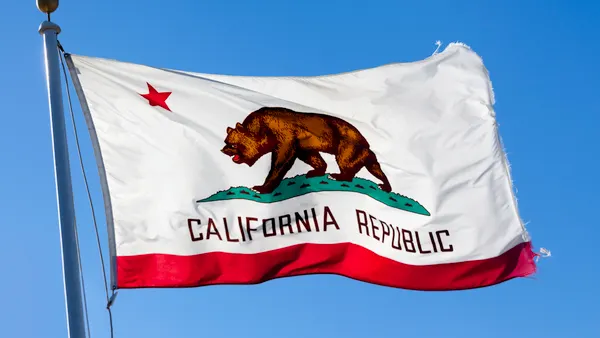Dive Brief:
- Lawmakers in the North Carolina House are expected to begin considering legislation to comprehensively modernize the state's energy policies, according to a statement from Speaker Tim Moore.
- The House Energy and Public Utilities Committee is scheduled to meet Tuesday to consider the "Competitive Energy Solutions" proposal, which leaders say has strong support from utilities.
- The plan would create a competitive bidding process for solar developers and put in place a solar leasing program allowing customers to work with private parties to install renewable energy.
Dive Insight:
North Carolina lawmaker want to modernize the state's energy policies to make renewable energy accessible and affordable, and they say they have taken input from a broad range of stakeholders in developing legislation.
Those efforts were led by Republican Representatives John Szoka and Dean Arp, whom Moore thanked in his statement for "finding a path forward to revolutionizing North Carolina’s energy policies with the support of power providers and utilities."
The legislation proposes a competitive bidding process for independent solar developers, similar to one incumbent utility Duke Energy wanted last year. Lawmakers say they want to keep costs down by using market-driven solutions to "ensure residential, commercial and industrial customers continue to have access to affordable, clean and reliable energy throughout the state." The bill would also create a Green Source Rider Program to allows large utility customers to take control of their energy purchasing.
According to the North State Journal, those goals will require the state to reform how it implements the federal Public Utilities Regulatory Policy Act, which mandates utilities buy renewable energy from independent developers. The bill follows calls from the state's Energy Policy Council last year requesting lawmakers to re-evaluate the state’s energy policy, including solar power policies,
Lawmakers are also proposing to create a solar leasing program allowing a competitive market to install renewable energy with competitive pricing, to encourage the development of rooftop and other solar energy projects through community and third-party leasing programs.
While North Carolina has emerged as a leader in solar energy, the state's utilities have expressed concern. Duke has indicated that at the current pace of solar expansion it might have to begin cycling nuclear plants, a costly proposition for a utility. In November 2016, the utility sought changes to PURPA that would allow it compete against independent developers for renewable projects and that would reduce the size and contract lengths for projects under the federal law.
Correction: A previous version of this post incorrectly said PURPA requires utilities to buy a certain amount of renewable energy. While PURPA does not put a limit on the amount of projects utilities must buy, it does place a size limit on them.














